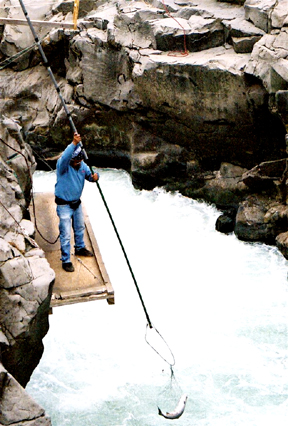The federal lawsuit U.S. v. Oregon is the ongoing court case that implements the Treaty of 1855 fishing rights of the Confederated Tribes of Warm Springs, and three other Columbia River treaty tribes.
The management agreement pursuant to U.S. v. Oregon is the fundamental guiding document for tribal fisheries at the Columbia. So having a long-term agreement with provisions that ensure tribal fishing rights is critical.
The management agreement also covers vital matters such as fisheries restoration at the Columbia, providing a framework for all parties in salmon and steelhead management.
An agreement like this can be hard to achieve, as there many parties involved: The Warm Springs, Yakama, Umatilla and Nez Perce tribes; and the states of Oregon, Washington and Idaho.
The management agreement is a court order to be strictly followed. As a court order, the agreement protects the tribes and other parties from lawsuits by others who may be against some of its terms, said John Ogan, tribal attorney.
Mr. Ogan gave an update last week at Tribal Council on the U.S. v. Oregon management agreement. There was good news, he said, in that it appears all parties are willing to extend the current agreement for another ten-year term.
The existing agreement is set to expire at the end of this year.
If the parties agree to extend the agreement, there would be no uncertainty or interruption in tribal treaty fishing at the Columbia.
Ruling in 1969
U.S. v. Oregon was initially filed in 1968 by the federal government on behalf of the tribes against the state of Oregon. The federal government handled the case as part of its trust responsibility.
Judge Belloni in 1969 ruled in favor of the tribes and the U.S., finding that the four treaty tribes are entitled to a “fair share” of the fish runs, and the state was limited in its power to regulate treaty Indian fisheries.
The state could only regulate when “reasonable and necessary for conservation,” the judge found. And he ruled state conservation regulations could not discriminate against the tribes, using the least restrictive means necessary.
The tribes’ “fair share” of the catch was determined to mean that the tribes’ fish harvest is split 50/50 with non-tribal fishing.
Since this initial ruling, the case has stayed open as a way for the court to monitor the U.S. v. Oregon management agreement.
10-year agreement
In 1977 the court approved a five-year agreement that established an in-river harvest-sharing formula between the tribal and non-tribal fish.
This plan failed because it did not include controls on ocean harvests, or specific measures to replace fish runs destroyed by development. It was also in 1977 that the four Columbia River Treaty Tribes established the Columbia River Inter-Tribal Fish Commission.
The parties eventually came to longer-term agreements that have been acceptable to all parties.
Then in more recent years, the Columbia Basin Fish Accords of 2004 set aside $1 billion to implement tribal fishery projects in the Columbia and tributaries. And the tribes and states reached a ten-agreement U.S. v. Oregon management agreement.
This is one that is set to expire at the end of the year, but which could be extended another decade, Mr. Ogan said.
This was welcome news to the Council members. Ogan said the case—implementing the tribal treaty fishing rights—is the one he takes most pride in working on. “It doesn’t get any more important than the treaty,” he said.
The Fish and Wildlife Committee of the Confederated Tribes has been a great help in the negotiating process, Ogan said.


